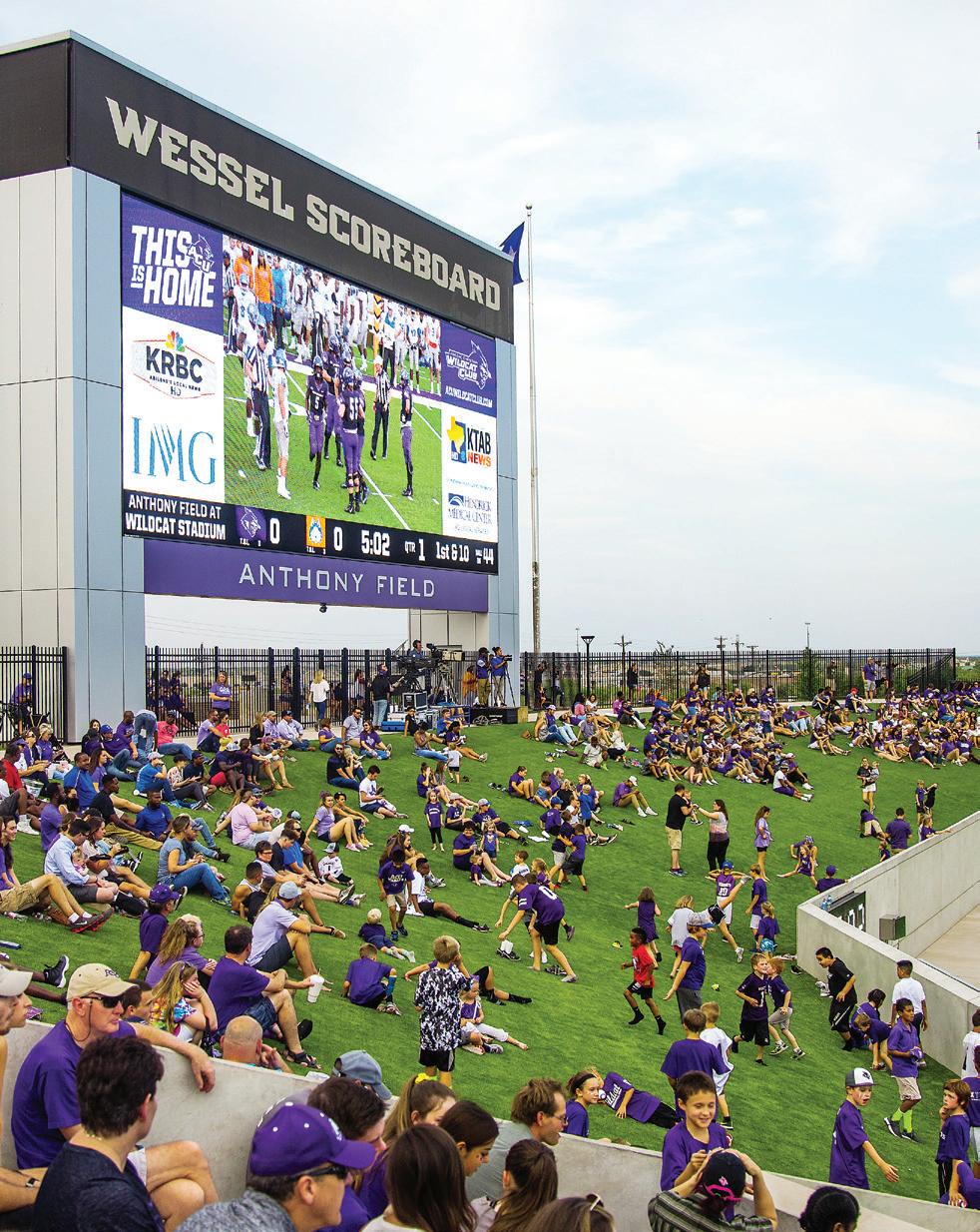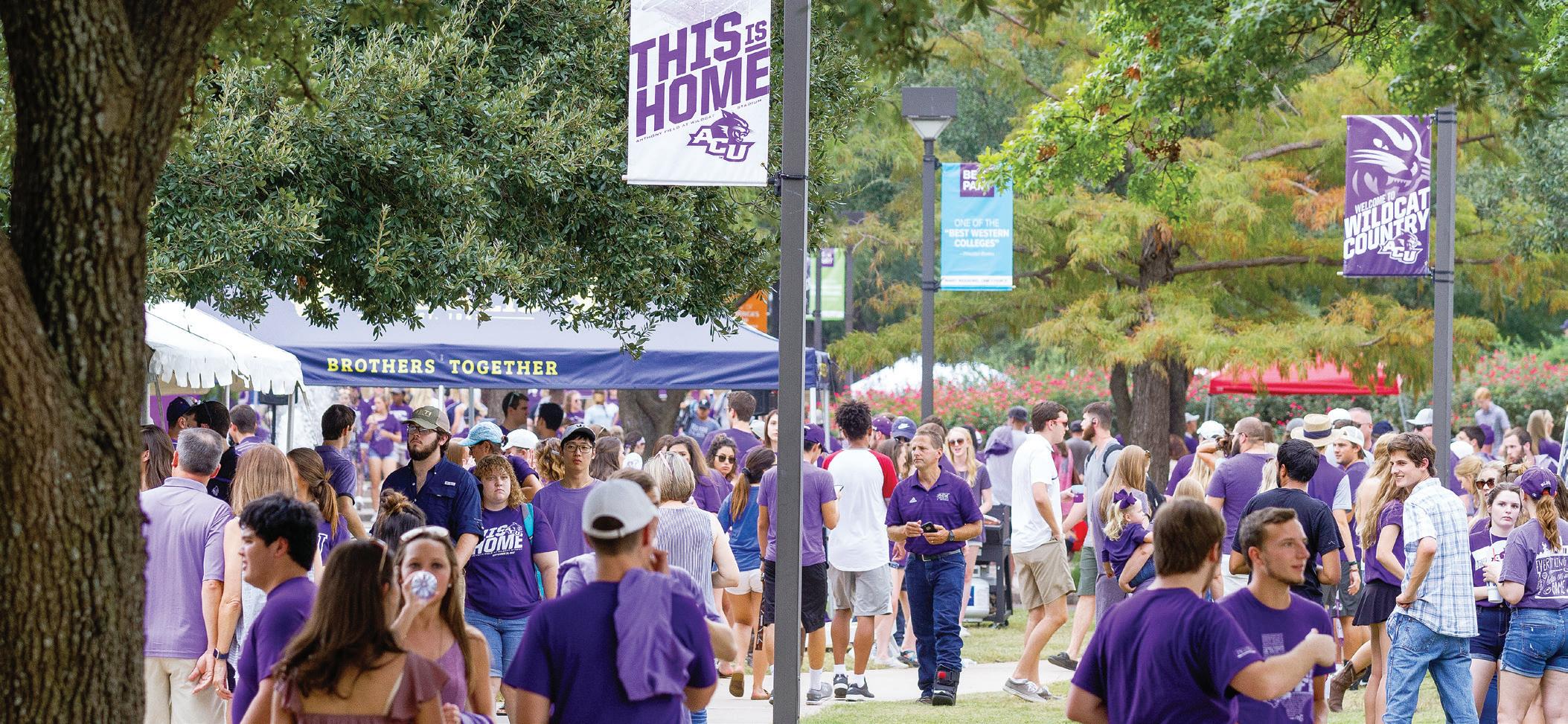
7 minute read
NCAA RULES FOR FRIENDS, FANS AND ALUMNI
RULES FOR FRIENDS, FANS AND ALUMNI
bilene Christian University is excited to continue the history of excellence in athletics as Division I members of the NCAA.
As we build this tradition, we rely heavily on you to support our efforts to be excellent in competition, in the classroom and with integrity in regards to NCAA and Southland Conference rules. As members of these prestigious organizations, we have agreed as a university to comply with the guidelines they have put in place. The best way for you to help us remain vigilant in this endeavor is to review the material provided in this brochure, and speak with our QUESTIONS REGARDING IMPORTANT NCAA DEFINITIONS
Who is a representative of athletics interests?
A “representative of the institution’s athletics interests” (booster) is an individual who donates money to the athletics program; anyone who has ever been a season ticket holder, fan, faculty or staff member or former student; anyone assisting in the recruitment of a prospect; and anyone involved in promoting the athletics program. Once you have been identified as an institutional representative of athletics interests, you retain that identity FOREVER. ONCE A BOOSTER, ALWAYS A BOOSTER.
Who is a prospective student-athlete?
A prospect is any student who has started the ninth grade (or for men’s basketball, the seventh grade). In addition, a student who has not started ninth-grade classes becomes a prospective student-athlete if the institution provides the individual (or the individual’s relatives or friends) any financial assistance or other benefits that the institution does not generally provide to prospective Athletics Compliance Office if you have any questions. Thank you for taking time to review this document and respect the demands placed on our student-athletes, coaches, staff members and other friends of our program. Maintaining excellence in compliance is as much of a priority as achieving it in athletics and academics. Thank you for your continued support.
GO WILDCATS!
Allen Ward, Director of Athletics students. Student-athletes enrolled in preparatory or two-year colleges also are considered prospective student-athletes.
When does a prospect become an intercollegiate student-athlete?
A prospect becomes a student-athlete only when he/she attends their first day of class or reports for an intercollegiate squad that is under the jurisdiction of the athletics program, not after they sign the National Letter of Intent.
What is a contact and what does it mean?
A contact is any face-to-face encounter between a prospect or the prospect’s relatives and an institutional staff member or athletics representative in which any dialogue occurs in excess of an exchange of a greeting. Any face-to-face encounter that is prearranged or takes place on the grounds of the prospect’s high school or site of organized competition or practice involving the prospect’s high school, preparatory school, two-year college, or all-star team is considered a contact regardless of the conversation that occurs.
What is the definition of recruiting?
Recruiting is any solicitation of a prospect or a prospect’s relatives (or legal guardians) by an institutional staff member or by a representative of the institution’s athletics interests for the purpose of securing the prospect’s enrollment and ultimate participation in the institution’s intercollegiate athletics programs.
NCAA RULES REGARDING PROSPECTIVE STUDENT-ATHLETES
What can you do and not do?
• You may attend high school or junior college sporting events you would normally attend, provided there is no contact with a prospective student-athlete. • You may send the Abilene Christian University coaching staff any newspaper clippings or other information about prospects you think would be of interest. • You may continue relationships with a prospect or his/her family as long as the relationship was established prior to the prospect’s freshman year of high school. • You may not become involved in making arrangements to provide money or financial aid of any kind to a prospect or the prospect’s family and friends. • You may not make contact with a prospective student-athlete and his/her parents when the prospect is on campus for an unofficial or official recruiting visit. • You may not contact a prospect to congratulate him/her on signing a National Letter of Intent with ACU. • You may not transport, pay or arrange payment of transportation costs for a prospect, and his/her relatives or friends to visit campus (or elsewhere). • You may not pay or arrange for payment of summer camp registration fees for a prospect. • You may not provide ANYTHING to a prospect, the prospect’s family or friends without prior approval from ACU’s Athletics Compliance Office. QUESTIONS REGARDING ENROLLED STUDENT-ATHLETES
Can I let a student-athlete borrow my car?
No, that would be an extra benefit. An extra benefit is defined as any special arrangement by an institutional employee or a representative of the institution’s athletics interests to provide a student-athlete or a student-athlete’s relatives or friends a benefit not expressly authorized by NCAA legislation. Receipt of a benefit by a student-athlete or their relatives or friends is not a violation of NCAA legislation if it is demonstrated that the same benefit is generally available to the institution’s students or their relatives or friends or to a particular segment of the student-body (e.g. international students) determined on a basis unrelated to athletic ability. Some extra benefits include, but are not limited to: • Cash • An employment arrangement for a prospect’s relatives • Gift of clothing or equipment • Co-signing of loans or posting bond • Any tangible items • Free or reduced-cost services, rentals or merchandise of any type • Free or reduced-cost housing • The use of a washer or dryer • Free summer storage • Promising employment after college graduation • Telephone card to make free long-distance calls • Meal at a restaurant or country club
Can I hire a student-athlete to work at my company or around my house?
Yes, but you must first contact the ACU Athletics Compliance Office. There are many NCAA regulations governing the employment of student-athletes, and documentation is required. Compensation received by a student-athlete must be solely based on the work actually performed and be at a rate equal to the going rate in that locality for similar services.
NCAA RULES REGARDING ENROLLED STUDENT-ATHLETES • You may provide a student-athlete or a team – not their family and friends – an occasional meal (defined as once per month) in your home, but not in a restaurant. Again, documentation is necessary prior to the meal taking place. • You may, if you would like, donate to
Abilene Christian University to recognize a student-athlete’s participation in a special event. • You may not pay for or arrange payment of room, board or any type of transportation for a student-athlete. • You may not provide room, board or transportation costs for family or friends of an enrolled student-athlete to visit campus or attend a home or an away athletics contest. • You may not use the name or picture or appearance of an enrolled student-athlete to advertise, recommend or promote sales or use of a commercial product or service of any kind.
Any use of a student-athlete’s name, picture or appearance must receive authorization from
ACU’s Athletics Compliance Office. • You may not provide an honorarium to a student-athlete for a speaking engagement.
All speaking engagements must be approved in advance by ACU’s Athletics Compliance Office. • You may not provide free or reduced-cost lodging in your home to a student-athlete or their family and friends.
NCAA RULES REGARDING GAMBLING The NCAA prohibits student-athletes or athletics program staff members from knowingly providing information to individuals involved in organized gambling activities concerning intercollegiate athletics competition. In addition, student-athletes or athletics program staff members may not solicit a bet on any intercollegiate team or accept a bet on any gambling activity involving intercollegiate and professional athletics through a bookmaker, parlay card, or any other method employed by organized gambling.
PROMOTIONAL AND COMMUNITY SERVICE ACTIVITIES FOR STUDENT-ATHLETES All charitable, educational and nonprofit promotional activities involving student-athletes must have prior approval from the ACU Athletics Compliance Office. Student-athletes are not permitted to be involved in the advertisement, recommendation or promotion of sales or use of a commercial product or service of any kind.
FINAL REMINDERS 1. Please contact the ACU Athletics Compliance
Office for NCAA rules interpretations.
We love to hear from our representatives of athletics interests. 2. Remember that in most cases, CONTACT
WITH A PROSPECT IS PROHIBITED! 3. Thank you for your support and interest in all of our athletics programs. Visit ncaa.org for more information.
MISSION STATEMENT OF ACU ATHLETICS COMPLIANCE OFFICE The mission of the ACU Athletics Compliance Office is to serve student-athletes, coaches, staff and boosters as well as uphold the integrity of the institution by: • Providing a comprehensive rules compliance education and monitoring program; • Effectively communicating our knowledge of NCAA, Southland Conference and institutional rules; and • Continuing to build upon our positive reputation by fostering existing relationships and creating greater public awareness of compliance.





